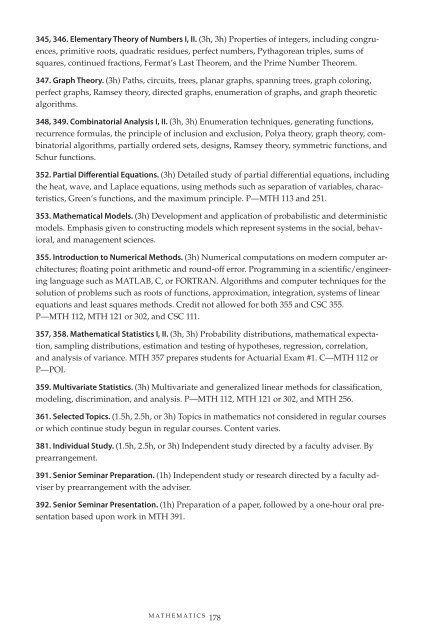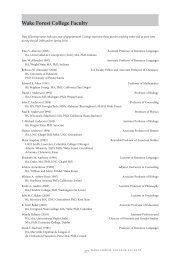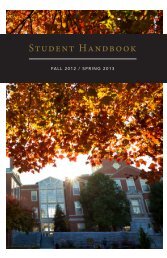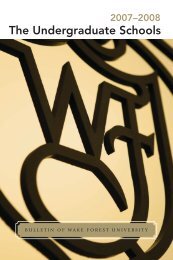theundergraduateschoo ls - Wake Forest University
theundergraduateschoo ls - Wake Forest University
theundergraduateschoo ls - Wake Forest University
Create successful ePaper yourself
Turn your PDF publications into a flip-book with our unique Google optimized e-Paper software.
345, 346. Elementary Theory of Numbers I, II. (3h, 3h) Properties of integers, including congruences,<br />
primitive roots, quadratic residues, perfect numbers, Pythagorean triples, sums of<br />
squares, continued fractions, Fermat’s Last Theorem, and the Prime Number Theorem.<br />
347. Graph Theory. (3h) Paths, circuits, trees, planar graphs, spanning trees, graph coloring,<br />
perfect graphs, Ramsey theory, directed graphs, enumeration of graphs, and graph theoretic<br />
algorithms.<br />
348, 349. Combinatorial Analysis I, II. (3h, 3h) Enumeration techniques, generating functions,<br />
recurrence formulas, the principle of inclusion and exclusion, Polya theory, graph theory, combinatorial<br />
algorithms, partially ordered sets, designs, Ramsey theory, symmetric functions, and<br />
Schur functions.<br />
352. Partial Differential Equations. (3h) Detailed study of partial differential equations, including<br />
the heat, wave, and Laplace equations, using methods such as separation of variables, characteristics,<br />
Green’s functions, and the maximum principle. P—MTH 113 and 251.<br />
353. Mathematical Mode<strong>ls</strong>. (3h) Development and application of probabilistic and deterministic<br />
mode<strong>ls</strong>. Emphasis given to constructing mode<strong>ls</strong> which represent systems in the social, behavioral,<br />
and management sciences.<br />
355. Introduction to Numerical Methods. (3h) Numerical computations on modern computer architectures;<br />
floating point arithmetic and round-off error. Programming in a scientific/engineering<br />
language such as MATLAB, C, or FORTRAN. Algorithms and computer techniques for the<br />
solution of problems such as roots of functions, approximation, integration, systems of linear<br />
equations and least squares methods. Credit not allowed for both 355 and CSC 355.<br />
P—MTH 112, MTH 121 or 302, and CSC 111.<br />
357, 358. Mathematical Statistics I, II. (3h, 3h) Probability distributions, mathematical expectation,<br />
sampling distributions, estimation and testing of hypotheses, regression, correlation,<br />
and analysis of variance. MTH 357 prepares students for Actuarial Exam #1. C—MTH 112 or<br />
P—POI.<br />
359. Multivariate Statistics. (3h) Multivariate and generalized linear methods for classification,<br />
modeling, discrimination, and analysis. P—MTH 112, MTH 121 or 302, and MTH 256.<br />
361. Selected Topics. (1.5h, 2.5h, or 3h) Topics in mathematics not considered in regular courses<br />
or which continue study begun in regular courses. Content varies.<br />
381. Individual Study. (1.5h, 2.5h, or 3h) Independent study directed by a faculty adviser. By<br />
prearrangement.<br />
391. Senior Seminar Preparation. (1h) Independent study or research directed by a faculty adviser<br />
by prearrangement with the adviser.<br />
392. Senior Seminar Presentation. (1h) Preparation of a paper, followed by a one-hour oral presentation<br />
based upon work in MTH 391.<br />
M A T H E M A T I C S 178






